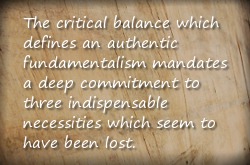Moving Toward Authenticity: Musings on Fundamentalism, Part 1
 Dr. Doug MacLachlan presented this paper at Central Seminary’s fall conference on Oct. 17, 2011. It will post here in two parts, today and tomorrow.
Dr. Doug MacLachlan presented this paper at Central Seminary’s fall conference on Oct. 17, 2011. It will post here in two parts, today and tomorrow.
My personal spiritual journey—it begins with a fundamental church.
The church is God’s good family in man’s broken world.
In 1 Timothy 3:15, Paul defines the church as: “the household (the family) of God.” In effect, Paul is saying to our 21st century body of Christ: “Be what you are:” The family of God in a world of fractured families; a home-base for the familially disenfranchised! A very significant part of our calling as 1st century Christians and churches in a 21st century world is to be a place where relational warmth, familial love, gospel truth, and biblical exposition can be found. If we fulfill this function biblically and compassionately we will impact our world rescuingly and redemptively for Jesus Christ.
I know this first from Scripture, but second from personal experience. My familial pedigree has never been considered very impressive. I am the son of a bartender, and the grandson of a gangster. My first encounter with “family” as it was ordained by God to be was in the context of a local, fundamental Baptist church in the small village of Montrose, MI where I was raised. I brought nothing of value or status to the small community of believers in Montrose Baptist Church, except my eternal soul as a creature made in God’s image, and as a sinner for whom Christ died. That was enough for that body of believers to welcome me into their midst and invite me into their homes.



Discussion